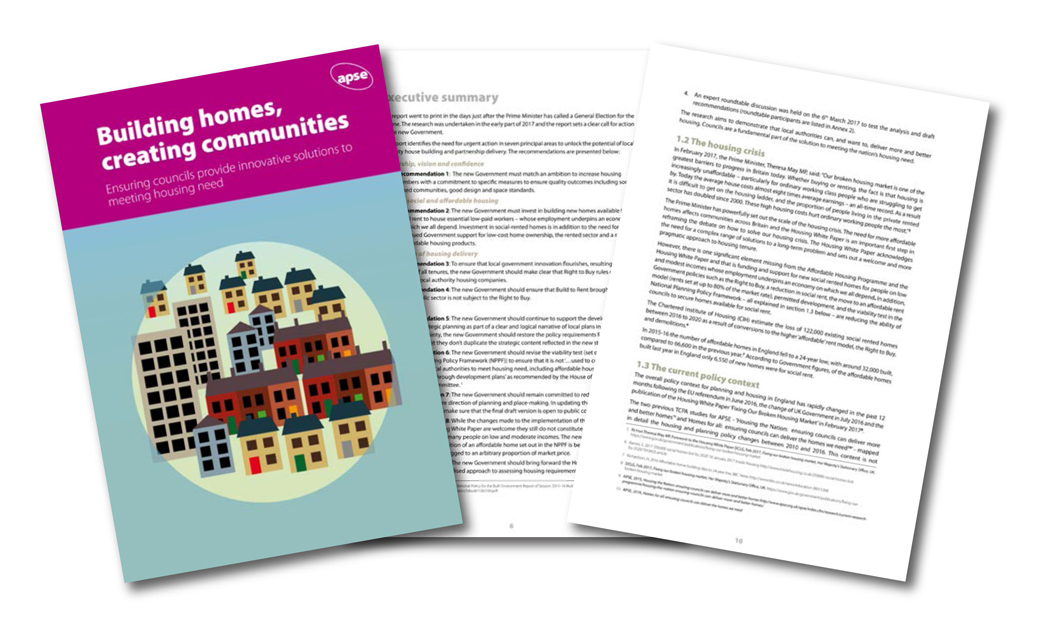
Kate Henderson, Chief Executive of the Town and Country Planning Association (TCPA), strongly believes councils are part of the solution to the housing crisis and highlights compelling research from the recent Building Homes, Creating Communities report.
 Housing is rarely out of the news. From rising homelessness to sky-high rents, it’s one of the major components of inequality in Britain today.
Housing is rarely out of the news. From rising homelessness to sky-high rents, it’s one of the major components of inequality in Britain today.
Theresa May has powerfully set out the scale of the housing crisis: ‘Our broken housing market is one of the greatest barriers to progress in Britain today. Whether buying or renting, the fact is that housing is increasingly unaffordable — particularly for ordinary working-class people who are struggling to get by. Today the average house costs almost eight times [the] average earnings — an all-time record. As a result it is difficult to get on the housing ladder, and the proportion of people living in the private rented sector has doubled since 2000. These high housing costs hurt ordinary working people the most.’
A recent study by the Town and Country Planning Association (TCPA) and Association for Public Service Excellence (APSE) highlights the chronic shortage of affordable housing in Britain. It reveals that 98% of councils across the UK describe their need for affordable housing as severe or moderate.
The report Building Homes, Creating Communities, argues that an ambition to increase housing numbers is, in itself, not enough; we also need to ensure that the homes which are built are both affordable and well designed.
At a local level councils across the country are innovating to secure much-needed affordable homes through new methods and partnership approaches. Such pioneering work is being undertaken in response to falling levels of government grant and difficulties in securing affordable housing through planning obligations such as Section 106 agreements.
A range of approaches are being trialled, from establishing local authority housing companies to supporting community-led housing. The TCPA/APSE research has found that just over half (51%) of the councils surveyed for the study were considering setting up or have already established a local housing delivery company, and a further 18% were setting up joint ventures.
Expanding into PRS
Councils are also demonstrating considerable interest in private rented sector housing, known as Build to Rent or PRS. 65% of councils that responded to the survey are currently delivering PRS or exploring PRS as an option. PRS can help meet the need for high-quality market rented homes, while providing a valuable revenue stream to cross-subsidise other council services. There is an opportunity for PRS to provide greater choice for people who require rented accommodation (out of choice or necessity). Local authority involvement in the private rent sector could also help ensure that PRS homes are well managed and maintained.
Against the background of local authority innovation is Brexit, which has generated uncertainty for councils, the wider housing and planning sector, and the national economy. Just 3% of councils surveyed thought Brexit would have a positive impact and that they would be able to build more homes.
One of the biggest concerns about Brexit revealed by the research is the shortage of construction skills. The report calls on government to support the expansion of the construction industry, recognising the current capacity constraints on delivery due to factors such as the limited availability of skilled and unskilled workers, equipment and raw materials. The study also recognises the important role councils can play in expanding the construction skills sector through apprenticeships.
Given the chronic shortage of affordable homes available to buy or rent, the new government must not let Brexit distract it from tackling the housing crisis in the UK.








